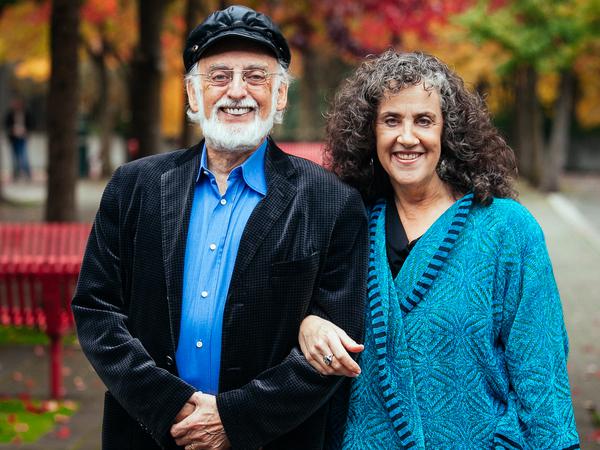Loving means talking to each other. And not just about who takes out the garbage or picks up the kids from music class – but about dreams and intimacy, money and trust. These are some of the issues that American psychologist and couples therapist John M. Gottman has identified as the most important issues in relationships. He has been researching love for decades. Together with his wife, the psychologist Julie Schwartz Gottman, he runs the “Love Lab” in Seattle, where they have observed thousands of couples via camera and evaluated their behavior.
In their book, 8 Conversations Every Couple Should Have…To Keep Love Alive, the Gottmans share their findings, complete with to-do lists, questionnaires, and case studies. The concept: Every couple, whether newly in love or married for decades, should consciously take time for eight dates, talk honestly and vulnerablely about the respective topic – and thus increase the chance of staying happily together until the end of their lives.
Conversation number one: What is trust?
A breach of trust does not have to mean infidelity. According to John and Julie Gottman, not showing up on time, not giving priority to your partner, or breaking promises are among the most common breaches of trust in a relationship. One of the two partners can plan the conversation, the other person should “just trust”. The Gottmans recommend a spot with a view that is quiet and sheltered. Another option is to alternately blindfold each other and walk through the house or apartment.

Ask your partner: Can you share a time when you felt you couldn’t trust me and what I could have done to change that? How are we similar and how do we differ in terms of trust and commitment? How can we accept these differences? It is important to be aware of your own needs, to communicate them honestly and not to blame others.
Conversation number two: How do we argue properly?
In the middle of a heated debate is not the best time to talk about conflict. So it’s better to take it easy. Differences of opinion are part of every relationship and, according to the Gottmans, at best can lead to greater understanding and deeper intimacy. Provided that mutual understanding is the goal of every conflict. It is also helpful to recognize and differentiate between solvable problems – for example who does how much in the household – and unsolvable or “eternal problems” that are based on different personality structures.
The date should be planned by the person who didn’t plan the first conversation. A suitable place is one that both find peaceful or where you as a couple have had a nice experience – for example a picnic in the park. Both should think about recurring points of contention before the date. Ask: What is the story behind the fact that this is important to you? How can I support you when you’re angry? Also, how anger was dealt with in the family should be a topic of conversation – and how a reparation after a quarrel could look like.
Conversation number three: What do we like about sex?
When you talk about sex, you tend to have more—and better—sex. Studies prove that. Another Gottman recipe for keeping the passion going is long kisses: at least six seconds, every day. For this date, the authors recommend a candlelight dinner in a place that feels particularly intimate and romantic. Dress in a way that makes you feel sexy.
The brave can also have the conversation at home at the dining table or in bed – naked. Questions to ask yourself include: What excites you? How should I signal to you that I would like to have sex? Remember the best sex you ever had together and wonder what made it so good. It is important to formulate positively instead of criticizing. And not to take the whole thing too seriously: humor and sex belong together.
Conversation number four: What do we spend money on?
Hardly anyone likes to talk about money, but the topic is one of the most common reasons for separation for couples. The Gottmans warn against categorizing others in conflicts about money in the usual stereotypes: the spender and the frugal. Rather, it should be explored what biographical experiences both have with money and what it means for the partner to have enough. Dealing with time and the division of housework also harbors a lot of potential for conflict. The date should cost as little as possible. Questions you can ask yourself include: How are you currently feeling about your work? What is your biggest fear about money?
Conversation number five: What does family mean to us?
Children are not always conducive to happiness in love. On the contrary: shortly after the birth of a child, two-thirds of all couples experience a slump in their marital satisfaction, with every additional child it goes further downhill. All the more important to talk about how this can be avoided. For the date, the Gottmans recommend a place where you will be surrounded by children, such as a playground or an amusement park. Those who chat at home can cook favorite dishes from childhood or bring children’s photos. Couples without children should definitely ask themselves whether and how many children they want to have – before they enter into a permanent commitment. Both should promise to prioritize their relationship despite having children.

Conversation number six: How much adventure do we need?
When was the last time you experienced something exciting with your partner? If you can’t remember, your relationship is suffering from a lack of fun and adventure, according to John and Julie Gottman. The psychologists are convinced that those who experience new things together and have fun create trust and intimacy: “Couples who play together stay together.” Be creative when it comes to the location for the date. Climb a tree, take a dip in the bathtub, go somewhere you’ve never been. Ask what play and adventure means to the other person and what one-day adventures you could imagine experiencing together.
Conversation number seven: How are you growing?
All people change over time. How the partner deals with the growth of the loved one is the decisive factor. In doing so, the Gottmans say, don’t try to get the other person to become like you — instead, learn from them and turn the differences into pluses. The date should be somewhere that feels “beautiful and sacred” to both of you. The partner should be honored in some way, such as a video message. Ask yourself: What gets you through difficult times? How have you changed in terms of your spirituality or religion? What have you grown on the most?
Conversation number eight: What are you dreaming of?
“Honoring each other’s dreams is the secret breeding ground for lifelong love,” write John and Julie Gottman. While the relationship together is a lifetime dream, it is equally important to keep dreams as individuals. To talk about it, find a place that inspires you or is important to a dream you share, such as a house in an area where you would like to live.
It is important not to talk too quickly about the practical implementation – even if the dream is difficult to achieve, let the loved one tell you about it without contradiction. Ask: Did your parents support you in fulfilling your childhood dreams? Make a commitment to do something specific over the next six months to support each other in fulfilling your dreams.
To home page

